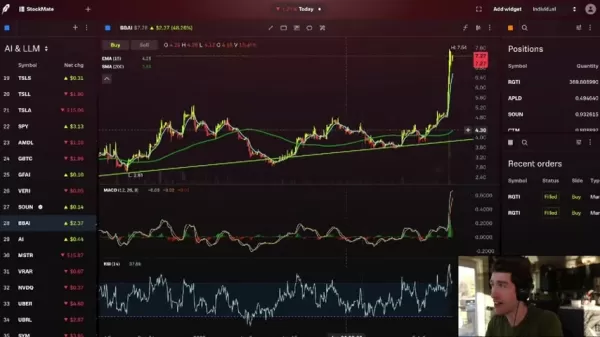Akamai Slashes Cloud Costs by 70% with AI-Driven Kubernetes Automation

In the era of generative AI, cloud expenses are soaring. Enterprises are projected to waste $44.5 billion on unnecessary cloud spending this year due to inefficient resource use.
Akamai Technologies, with its vast, multi-cloud infrastructure and stringent security demands, faces this challenge acutely.
To address this, the cybersecurity and content delivery giant adopted Cast AI’s Kubernetes automation platform, leveraging AI agents to optimize cost, security, and performance across cloud environments.
The solution delivered cloud cost reductions of 40% to 70%, depending on workload.
“We required continuous optimization of our infrastructure to cut cloud costs without compromising performance,” said Dekel Shavit, senior director of cloud engineering at Akamai, in an interview with VentureBeat. “As a security event processor, delays are unacceptable. Failure to respond to attacks in real time is not an option.”
AI Agents for Real-Time Monitoring and Optimization
Kubernetes streamlines application deployment, scaling, and management, especially in cloud-native and microservices setups.
Cast AI integrates with Kubernetes to help clients scale clusters, select optimal infrastructure, and manage compute lifecycles, explained Laurent Gil, founder and CEO. Its Application Performance Automation (APA) platform uses specialized AI agents to continuously monitor, analyze, and enhance application performance, security, efficiency, and cost. Companies can provision only the necessary compute from providers like AWS, Microsoft, or Google.
APA leverages machine learning models with reinforcement learning, drawing on historical data and patterns, combined with observability tools and heuristics. Integrated with infrastructure-as-code tools across multiple clouds, it offers full automation.
Gil stressed that observability is merely the starting point, not the end goal. Cast AI supports gradual adoption, integrating with existing tools and workflows without requiring a complete overhaul. All analysis and actions remain within the customer’s dedicated Kubernetes clusters, ensuring enhanced security and control.
Gil also highlighted human-centric automation, noting that APA supports human-in-the-loop workflows, complementing decision-making.
Akamai’s Complex Infrastructure Demands
Shavit explained that Akamai’s sprawling cloud infrastructure supports its content delivery network (CDN) and cybersecurity services for some of the world’s most demanding clients, adhering to strict service level agreements (SLAs) and performance standards.
As one of the largest consumers of certain vendor services, Akamai has undertaken extensive engineering and reengineering with its hyperscaler to meet its needs.
Serving diverse clients, including major financial institutions and credit card companies, Akamai’s services are critical to their security posture.
Balancing this complexity with cost is a challenge. Shavit noted that real-world attacks could spike capacity needs by 100X or 1,000X for specific components. However, pre-scaling cloud capacity by such magnitudes is financially impractical.
While code-level optimization was considered, the complexity of Akamai’s business model necessitated focusing on core infrastructure.
Real-Time Kubernetes Optimization
Akamai needed a Kubernetes automation platform to optimize costs across its multi-cloud infrastructure in real time, dynamically scaling applications based on fluctuating demand without sacrificing performance, Shavit explained.
Previously, Akamai’s DevOps team manually adjusted Kubernetes workloads a few times a month, a costly and challenging process given the infrastructure’s scale. This sporadic approach missed real-time optimization opportunities.
“Now, hundreds of Cast AI agents perform this tuning every second,” Shavit said.
Key APA features Akamai relies on include autoscaling, advanced Kubernetes automation with bin packing, automatic selection of cost-efficient compute instances, workload rightsizing, Spot instance automation across the instance lifecycle, and cost analytics.
“Within two minutes of integration, we gained unprecedented cost analytics insights,” Shavit said. “Once the agents were active, optimization began, and savings followed automatically.”
Spot instances, offering discounted unused cloud capacity, were appealing but complex for Akamai’s workloads, especially Apache Spark. Overengineering or adding manual effort was cost-prohibitive.
With Cast AI, Akamai utilized Spot instances for Spark with zero engineering investment. “The value of Spot instances was obvious; we just needed the right tool,” Shavit said.
While doubling or tripling savings on cloud bills is significant, Shavit emphasized that automation without manual intervention is “priceless,” saving substantial time.
Previously, his team constantly adjusted infrastructure to maintain production environments and meet customer needs.
“The greatest benefit is that we no longer manage our infrastructure,” Shavit said. “Cast AI’s agents handle it, freeing our team to focus on delivering features faster to customers.”
Editor’s note: At this month’s VB Transform, Google Cloud CTO Will Grannis and Highmark Health SVP and Chief Analytics Officer Richard Clarke will explore the new AI stack in healthcare and the challenges of deploying multi-model AI systems in a complex, regulated environment. Register today.
Related article
 Adobe's AI Strategy: Winners and Losers in the Tech Race
In the fast-changing world of artificial intelligence (AI), investors are closely watching which companies will thrive in this tech transformation. This article examines Adobe's AI approach, recent fi
Adobe's AI Strategy: Winners and Losers in the Tech Race
In the fast-changing world of artificial intelligence (AI), investors are closely watching which companies will thrive in this tech transformation. This article examines Adobe's AI approach, recent fi
 BigBear.ai (BBAI) Stock Outlook: Can Its AI Growth Momentum Persist?
In the fast-paced world of artificial intelligence (AI) and cybersecurity, BigBear.ai (BBAI) is capturing investor interest. This article offers an in-depth analysis of BigBear.ai’s stock, exploring i
BigBear.ai (BBAI) Stock Outlook: Can Its AI Growth Momentum Persist?
In the fast-paced world of artificial intelligence (AI) and cybersecurity, BigBear.ai (BBAI) is capturing investor interest. This article offers an in-depth analysis of BigBear.ai’s stock, exploring i
 How The Ottawa Hospital uses AI ambient voice capture to reduce physician burnout by 70%, achieve 97% patient satisfaction
How AI is Transforming Healthcare: Reducing Burnout and Improving Patient CareThe Challenge: Clinician Overload and Patient AccessHealthcare systems worldwide face a dual challenge: clinician burnout and patient access delays. Physicians are drowning in administrative tasks, while patients struggle
Comments (2)
0/200
How The Ottawa Hospital uses AI ambient voice capture to reduce physician burnout by 70%, achieve 97% patient satisfaction
How AI is Transforming Healthcare: Reducing Burnout and Improving Patient CareThe Challenge: Clinician Overload and Patient AccessHealthcare systems worldwide face a dual challenge: clinician burnout and patient access delays. Physicians are drowning in administrative tasks, while patients struggle
Comments (2)
0/200
![JeffreyMartinez]() JeffreyMartinez
JeffreyMartinez
 July 22, 2025 at 3:35:51 AM EDT
July 22, 2025 at 3:35:51 AM EDT
This AI-driven Kubernetes stuff from Akamai sounds like a game-changer! Cutting cloud costs by 70% is wild—imagine all the extra coffee I could buy with that kind of savings. 😄 Curious how smaller companies can get in on this without breaking the bank.


 0
0
![LawrenceNelson]() LawrenceNelson
LawrenceNelson
 July 22, 2025 at 2:33:07 AM EDT
July 22, 2025 at 2:33:07 AM EDT
This AI-driven Kubernetes stuff sounds wild! Cutting cloud costs by 70%? That's like finding a coupon for your entire grocery bill! Curious how it holds up in smaller setups though.


 0
0

In the era of generative AI, cloud expenses are soaring. Enterprises are projected to waste $44.5 billion on unnecessary cloud spending this year due to inefficient resource use.
Akamai Technologies, with its vast, multi-cloud infrastructure and stringent security demands, faces this challenge acutely.
To address this, the cybersecurity and content delivery giant adopted Cast AI’s Kubernetes automation platform, leveraging AI agents to optimize cost, security, and performance across cloud environments.
The solution delivered cloud cost reductions of 40% to 70%, depending on workload.
“We required continuous optimization of our infrastructure to cut cloud costs without compromising performance,” said Dekel Shavit, senior director of cloud engineering at Akamai, in an interview with VentureBeat. “As a security event processor, delays are unacceptable. Failure to respond to attacks in real time is not an option.”
AI Agents for Real-Time Monitoring and Optimization
Kubernetes streamlines application deployment, scaling, and management, especially in cloud-native and microservices setups.
Cast AI integrates with Kubernetes to help clients scale clusters, select optimal infrastructure, and manage compute lifecycles, explained Laurent Gil, founder and CEO. Its Application Performance Automation (APA) platform uses specialized AI agents to continuously monitor, analyze, and enhance application performance, security, efficiency, and cost. Companies can provision only the necessary compute from providers like AWS, Microsoft, or Google.
APA leverages machine learning models with reinforcement learning, drawing on historical data and patterns, combined with observability tools and heuristics. Integrated with infrastructure-as-code tools across multiple clouds, it offers full automation.
Gil stressed that observability is merely the starting point, not the end goal. Cast AI supports gradual adoption, integrating with existing tools and workflows without requiring a complete overhaul. All analysis and actions remain within the customer’s dedicated Kubernetes clusters, ensuring enhanced security and control.
Gil also highlighted human-centric automation, noting that APA supports human-in-the-loop workflows, complementing decision-making.
Akamai’s Complex Infrastructure Demands
Shavit explained that Akamai’s sprawling cloud infrastructure supports its content delivery network (CDN) and cybersecurity services for some of the world’s most demanding clients, adhering to strict service level agreements (SLAs) and performance standards.
As one of the largest consumers of certain vendor services, Akamai has undertaken extensive engineering and reengineering with its hyperscaler to meet its needs.
Serving diverse clients, including major financial institutions and credit card companies, Akamai’s services are critical to their security posture.
Balancing this complexity with cost is a challenge. Shavit noted that real-world attacks could spike capacity needs by 100X or 1,000X for specific components. However, pre-scaling cloud capacity by such magnitudes is financially impractical.
While code-level optimization was considered, the complexity of Akamai’s business model necessitated focusing on core infrastructure.
Real-Time Kubernetes Optimization
Akamai needed a Kubernetes automation platform to optimize costs across its multi-cloud infrastructure in real time, dynamically scaling applications based on fluctuating demand without sacrificing performance, Shavit explained.
Previously, Akamai’s DevOps team manually adjusted Kubernetes workloads a few times a month, a costly and challenging process given the infrastructure’s scale. This sporadic approach missed real-time optimization opportunities.
“Now, hundreds of Cast AI agents perform this tuning every second,” Shavit said.
Key APA features Akamai relies on include autoscaling, advanced Kubernetes automation with bin packing, automatic selection of cost-efficient compute instances, workload rightsizing, Spot instance automation across the instance lifecycle, and cost analytics.
“Within two minutes of integration, we gained unprecedented cost analytics insights,” Shavit said. “Once the agents were active, optimization began, and savings followed automatically.”
Spot instances, offering discounted unused cloud capacity, were appealing but complex for Akamai’s workloads, especially Apache Spark. Overengineering or adding manual effort was cost-prohibitive.
With Cast AI, Akamai utilized Spot instances for Spark with zero engineering investment. “The value of Spot instances was obvious; we just needed the right tool,” Shavit said.
While doubling or tripling savings on cloud bills is significant, Shavit emphasized that automation without manual intervention is “priceless,” saving substantial time.
Previously, his team constantly adjusted infrastructure to maintain production environments and meet customer needs.
“The greatest benefit is that we no longer manage our infrastructure,” Shavit said. “Cast AI’s agents handle it, freeing our team to focus on delivering features faster to customers.”
Editor’s note: At this month’s VB Transform, Google Cloud CTO Will Grannis and Highmark Health SVP and Chief Analytics Officer Richard Clarke will explore the new AI stack in healthcare and the challenges of deploying multi-model AI systems in a complex, regulated environment. Register today.
 Adobe's AI Strategy: Winners and Losers in the Tech Race
In the fast-changing world of artificial intelligence (AI), investors are closely watching which companies will thrive in this tech transformation. This article examines Adobe's AI approach, recent fi
Adobe's AI Strategy: Winners and Losers in the Tech Race
In the fast-changing world of artificial intelligence (AI), investors are closely watching which companies will thrive in this tech transformation. This article examines Adobe's AI approach, recent fi
 BigBear.ai (BBAI) Stock Outlook: Can Its AI Growth Momentum Persist?
In the fast-paced world of artificial intelligence (AI) and cybersecurity, BigBear.ai (BBAI) is capturing investor interest. This article offers an in-depth analysis of BigBear.ai’s stock, exploring i
BigBear.ai (BBAI) Stock Outlook: Can Its AI Growth Momentum Persist?
In the fast-paced world of artificial intelligence (AI) and cybersecurity, BigBear.ai (BBAI) is capturing investor interest. This article offers an in-depth analysis of BigBear.ai’s stock, exploring i
 How The Ottawa Hospital uses AI ambient voice capture to reduce physician burnout by 70%, achieve 97% patient satisfaction
How AI is Transforming Healthcare: Reducing Burnout and Improving Patient CareThe Challenge: Clinician Overload and Patient AccessHealthcare systems worldwide face a dual challenge: clinician burnout and patient access delays. Physicians are drowning in administrative tasks, while patients struggle
How The Ottawa Hospital uses AI ambient voice capture to reduce physician burnout by 70%, achieve 97% patient satisfaction
How AI is Transforming Healthcare: Reducing Burnout and Improving Patient CareThe Challenge: Clinician Overload and Patient AccessHealthcare systems worldwide face a dual challenge: clinician burnout and patient access delays. Physicians are drowning in administrative tasks, while patients struggle
 July 22, 2025 at 3:35:51 AM EDT
July 22, 2025 at 3:35:51 AM EDT
This AI-driven Kubernetes stuff from Akamai sounds like a game-changer! Cutting cloud costs by 70% is wild—imagine all the extra coffee I could buy with that kind of savings. 😄 Curious how smaller companies can get in on this without breaking the bank.


 0
0
 July 22, 2025 at 2:33:07 AM EDT
July 22, 2025 at 2:33:07 AM EDT
This AI-driven Kubernetes stuff sounds wild! Cutting cloud costs by 70%? That's like finding a coupon for your entire grocery bill! Curious how it holds up in smaller setups though.


 0
0





























